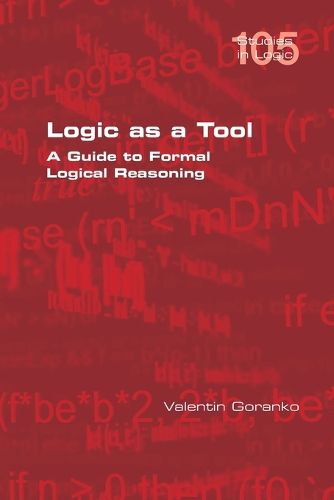Readings Newsletter
Become a Readings Member to make your shopping experience even easier.
Sign in or sign up for free!
You’re not far away from qualifying for FREE standard shipping within Australia
You’ve qualified for FREE standard shipping within Australia
The cart is loading…






This title is printed to order. This book may have been self-published. If so, we cannot guarantee the quality of the content. In the main most books will have gone through the editing process however some may not. We therefore suggest that you be aware of this before ordering this book. If in doubt check either the author or publisher’s details as we are unable to accept any returns unless they are faulty. Please contact us if you have any questions.
This textbook, written in a concise yet user-friendly style, will guide the reader in understanding and mastering the use of classical logic as a tool for performing logically correct reasoning. It offers a systematic and precise exposition of classical logic on both propositional and ?rst-order level with many examples and exercises and only the necessary minimum of theory. Most of the exercises are provided with answers or detailed solutions.
The book explains the grammar, semantics, and use of classical logical languages and teaches the reader how to grasp the meaning and translate the formulae of classical logic to and from natural language. It illustrates with many detailed examples the use of the most popular deductive systems - axiomatic systems, semantic tableaux, natural deduction, and resolution - for formalizing and automating logical reasoning and provides the reader with the technical skills needed for practical derivations. Systematic guidelines are offered on how to carry out logically correct and well-structured reasoning using the proof strategies and techniques that these deductive systems employ.
The book is accompanied with a set of detailed slides available online and can be used as a textbook for introductory or intermediate courses in classical logic for students in mathematics, computer science, philosophy, or related disciplines, as well as for self-study.
$9.00 standard shipping within Australia
FREE standard shipping within Australia for orders over $100.00
Express & International shipping calculated at checkout
This title is printed to order. This book may have been self-published. If so, we cannot guarantee the quality of the content. In the main most books will have gone through the editing process however some may not. We therefore suggest that you be aware of this before ordering this book. If in doubt check either the author or publisher’s details as we are unable to accept any returns unless they are faulty. Please contact us if you have any questions.
This textbook, written in a concise yet user-friendly style, will guide the reader in understanding and mastering the use of classical logic as a tool for performing logically correct reasoning. It offers a systematic and precise exposition of classical logic on both propositional and ?rst-order level with many examples and exercises and only the necessary minimum of theory. Most of the exercises are provided with answers or detailed solutions.
The book explains the grammar, semantics, and use of classical logical languages and teaches the reader how to grasp the meaning and translate the formulae of classical logic to and from natural language. It illustrates with many detailed examples the use of the most popular deductive systems - axiomatic systems, semantic tableaux, natural deduction, and resolution - for formalizing and automating logical reasoning and provides the reader with the technical skills needed for practical derivations. Systematic guidelines are offered on how to carry out logically correct and well-structured reasoning using the proof strategies and techniques that these deductive systems employ.
The book is accompanied with a set of detailed slides available online and can be used as a textbook for introductory or intermediate courses in classical logic for students in mathematics, computer science, philosophy, or related disciplines, as well as for self-study.